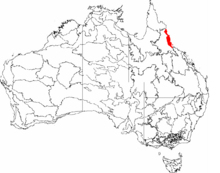Ngaygungu people facts for kids
Quick facts for kids Ngaygungu people |
|
|---|---|
| Aka: Ngai-kungo-i | |

Wet Tropics BioRegion
|
|
| Language | |
| Language Family: | Pama–Nyungan |
| Language Branch: | Maric |
| Language Group: | Ngaygungu |
| BioRegion: | Wet Tropics |
| Location: | Far North Queensland |
| Coordinates: | 17°15′45″S 145°28′37″E / 17.26250°S 145.47694°E |
| Urban Areas: | |
The Ngaygungu people (also known as Ngaygungyi or Ngai-kungo-i) are an Aboriginal group from the Atherton, Queensland area in Australia. Their ancestors spoke the Ngaygungu language. They are an important part of Australia's rich history and culture.
Contents
Where Did the Ngaygungu People Live?
The Ngaygungu people were officially recognized as a unique local group for Atherton, Queensland, in October 1898. This was done by a person named Walter Edmund Roth. He met Aboriginal people who called themselves Ngai-kungo-i.
Their Traditional Lands
These people spoke their own language, which they called Ngai-kungo. Their main home base was in Atherton, which they called Kȃr-kar. They also traveled widely across their traditional lands. This included areas up into the Great Dividing Range behind Atherton. They also crossed the top parts of the Walsh River, an area they called Balkan. Their travels also took them to the town of Watsonville, which they knew as Ilȃnbare. This movement across their land was part of their traditional way of life, sometimes called "walk-about".
What Was Their Culture Like?
Walter Roth not only learned about where the Ngai-kungo-i lived, but he also studied their material culture. This means the tools, art, and other objects they made and used every day.
Objects and Collections
Roth wrote about these items and collected many samples. Later, the Australian Museum bought many of these important pieces from him. These collections help us understand more about the Ngaygungu people's way of life and their amazing skills.
 | DeHart Hubbard |
 | Wilma Rudolph |
 | Jesse Owens |
 | Jackie Joyner-Kersee |
 | Major Taylor |

